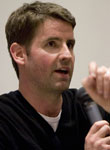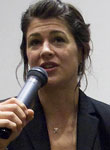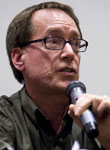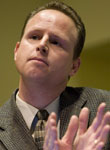 |
|||||
| Communication Home | Calendar | Make a Gift | UW Alumni | |||||
|
March 2009 | Return to issue home
Bringing the Classroom to the Public We are committed to bringing our ideas into the public conversation, and to asking the public for ideas and suggestions. Learning is a two-way street, and when there are great social changes underway—like we now see with the crisis in journalism and the rise of social media—then we want to be in the midst in figuring it all out. We see that as our role as a 21st-century Communication Department.—Professor and interim Chair David DomkeJournalism on the Brink Journalism on the Brink? Can Digital Save It? Was moderated by Hanson Hosein, a former Emmy Award-winning NBC journalist and now the director of the Master of Communication in Digital Media (MCDM) at the University of Washington.
Professor David Domke, head of the Department’s journalism program and interim chair of the Department hosted the event and were joined by:
The Digital President Facebook. Twitter. Mybarackobama.com. Text messaging. How did he do it? What strategic lessons can we learn from Barack Obama’s high-tech campaign? How might he deploy this online army of millions to govern? And does President Obama’s historic rise to the White House also propel social networking into the mainstream? The answers to these important questions have a profound impact on the very near future of our democracy, as well as how we organize, communicate and even do business in the digital age. Hanson Hosein, director of the the MCDM, was joined by:
Media in Crisis: The Journalist as Entrepreneur The Common Language Project: Three 20-something Seattle-ites have decided to skip the coffee-fetching internship positions and go straight into the journalism profession: by raising funds to report on under-covered stories around the world. They present an exciting new business model to future journalists and storytellers. How do they get paid? What are the copyright issues? How do they persuade established news organizations to acquire their content? How do they manage logistics on the ground in far-flung places? What are the best tools for this kind of work? How do you report for print, radio, and online all at the same time? March 2009 | Return to issue home |
|||||
|
|||||



